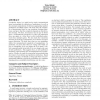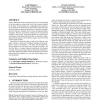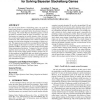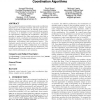ATAL
2008
Springer
14 years 1 months ago
2008
Springer
We address the learning of trust based on past observations and context information. We argue that from the truster's point of view trust is best expressed as one of several ...
ATAL
2008
Springer
14 years 1 months ago
2008
Springer
Complexity theory is a useful tool to study computational issues surrounding the elicitation of preferences, as well as the strategic manipulation of elections aggregating togethe...
ATAL
2008
Springer
14 years 1 months ago
2008
Springer
In many multiagent settings, each agent's goal is to come out ahead of the other agents on some metric, such as the currency obtained by the agent. In such settings, it is no...
ATAL
2008
Springer
14 years 1 months ago
2008
Springer
We generalize AGM belief revision theory to the multi-agent case. To do so, we first generalize the semantics of the singleagent case, based on the notion of interpretation, to th...
ATAL
2008
Springer
14 years 1 months ago
2008
Springer
Bots for Real Time Strategy (RTS) games provide a rich challenge to implement. A bot controls a number of units that may have to navigate in a partially unknown environment, while...
ATAL
2008
Springer
14 years 1 months ago
2008
Springer
In this paper, we present ARF, our initial effort at solving taskallocation problems where cooperative agents need to perform tasks simultaneously. An example is multi-agent routi...
ATAL
2008
Springer
14 years 1 months ago
2008
Springer
Recent work by Procaccia, Rosenschein and Zohar [14] established some results regarding the complexity of manipulation and control in elections with multiple winners, such as elec...
ATAL
2008
Springer
14 years 1 months ago
2008
Springer
In repeated games with incomplete information, rational agents must carefully weigh the tradeoffs of advantageously exploiting their information to achieve a short-term gain versu...
ATAL
2008
Springer
14 years 1 months ago
2008
Springer
In a class of games known as Stackelberg games, one agent (the leader) must commit to a strategy that can be observed by the other agent (the follower or adversary) before the adv...
ATAL
2008
Springer
14 years 1 months ago
2008
Springer
Due to computational intractability, large scale coordination algorithms are necessarily heuristic and hence require tuning for particular environments. In domains where character...




